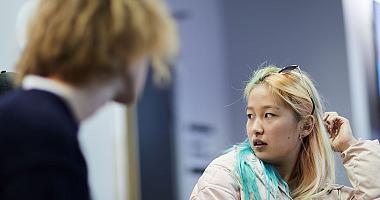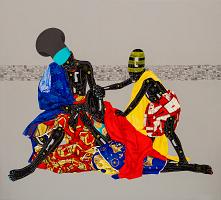PGDip Digital Media – Theory
Content navigation menu
Why study digital media at Goldsmiths
The Postgraduate Diploma in Digital Media – Theory is unique in its combination of theoretical approaches to contemporary media and technology.
- This programme is designed to help you understand digital transformations in media, culture, and society in the media and creative industries, and in further research. You will be equipped with skills that can be applied to current and future developments in digital media, social media, computing, and other aspects of technology.
- The PGDip in Digital Media – Theory offers a critical and contextual approach to digital media and technology. It explicitly discusses approaches to 'new' media in academic and professional debates, especially those that overemphasise the potential for radical social change led by a technology itself. The programme emphasises the importance of addressing the social and historical contexts within which a range of media technologies are employed.
Learn valuable skills
- You will be equipped with skills in critical evaluation and contextualisation that can be applied to future developments in digital media and technology. The programme is therefore appropriate for further research and for careers in the media and cultural industries.
- You will draw on a range of disciplines during the programme to develop a contextual framework for thinking about digital media and technologies as fully cultural forms and processes, including media and cultural studies, sociology, anthropology, and philosophy.
Learn from experts
- The core teaching team from within the Department of Media, Communications and Cultural Studies (MCCS) provides expertise in critical, practical, technical, and contextual approaches to digital media and technology. You will learn from tutors from a range of professional and academic backgrounds, as well as, a schedule of guest seminars in digital media and technology provided by the department and Goldsmiths.
- The Department of MCCS has been ranked second in the UK for 'world-leading or internationally excellent' research (Research Excellence Framework, 2021) and 16th in the world (third in the UK) in the 2024 QS World Rankings for communication and media studies.
Contact
If you have specific questions about the degree, contact Daniel Rourke.
Length
1 year full-time; 2 years part-time
Entry requirements
Applicants will normally have or expect to gain a first degree of at least second class standard (or equivalent). Consideration may also be given to others, but please see Entry Requirements section below for more information.
Fees
Home - full-time: £7900
Home - part-time: £3950
International - full-time: £15400
School
What you'll study
All students will take Digital Media: Critical Perspectives and then choose one of the other modules listed below.
| Module title | Credits |
|---|---|
| Digital Media: Critical Perspectives | 30 credits |
| Digital Culture: Critical Theory | 30 credits |
| or | |
| Software Studies | 15 or 30 credits |
| or | |
| Photography and After | 15 credits |
Please see the programme specification document for more information about the modules
Note about optional modules (if available): The above is indicative of the typical modules offered, but is not intended to be construed or relied on as a definitive list of what might be available in any given year. The module content and availability is subject to change.
How you'll be assessed
Taught sessions and lectures provide overviews of themes, which students are encouraged to complement with intensive reading for presentation and discussion with peers at seminars. Assessments build on lectures and seminars so students are expected to attend all taught sessions to build knowledge and their own understanding of their chosen discipline.
All assessed work is accompanied by some form of feedback to ensure that students’ work is on the right track. It may come in a variety of forms ranging from written comments on a marked essay to oral and written feedback on developing projects and practice as they attend workshops.
Entry requirements
Applicants will normally have or expect to gain a first degree of at least second class standard (or equivalent).
The programme is suitable for students from a wide range of disciplinary backgrounds within the humanities and no prior knowledge of new or digital media studies is required.
Consideration may also be given to students without an academic background in a relevant subject area if they have significant professional experience in the field of digital media and are able to demonstrate their ability and commitment to the pursuit of a programme of rigorous academic study.
All applicants need to demonstrate an awareness of the historical and contemporary significance of digital media and technology and a willingness to accept the challenge of interdisciplinary study.
International qualifications
We accept a wide range of international qualifications. Find out more about the qualifications we accept from around the world.
If English isn’t your first language, you will need an IELTS score (or equivalent English language qualification) of 6.5 with a 6.5 in writing and no element lower than 6.0 to study this programme. If you need assistance with your English language, we offer a range of courses that can help prepare you for postgraduate-level study.
How to apply
Apply directly to Goldsmiths using our online application system.
Find out more about applying for a postgraduate qualification at Goldsmiths.
Fees and funding
Annual tuition fees
These are the PG fees for students starting their programme in the 2025/2026 academic year.
- Home - full-time: £7900
- Home - part-time: £3950
- International - full-time: £15400
If your fees are not listed here, please check our postgraduate fees guidance or contact the Fees Office, who can also advise you about how to pay your fees.
It’s not currently possible for international students to study part-time under a student visa. If you think you might be eligible to study part-time while being on another visa type, please contact our Admissions Team for more information.
If you are looking to pay your fees please see our guide to making a payment.
Funding opportunities
Explore the Goldsmiths scholarships finder to find out what funding you may be eligible for.
Paying your fees
Find out about paying your tuition fees.
If you are a UK student you may be eligible for a postgraduate loan.
Find out more about postgraduate fees and explore funding opportunities. If you're applying for funding, you may be subject to an application deadline.
Additional costs
In addition to your tuition fees, you'll be responsible for any additional costs associated with your course, such as buying stationery and paying for photocopying. You can find out more about what you need to budget for on our study costs page.
There may also be specific additional costs associated with your programme. This can include things like paying for field trips or specialist materials for your assignments. Please check the programme specification for more information.
Careers
We provide graduates with skills that are cutting edge:
- In the critical analysis and/or creative production of digital media
- In the disciplinary knowledge and conceptual frameworks necessary for current and future forms of media and technology
- In the awareness of how digital media and technologies are re-shaping society from the ways we communicate (through social media and web 2.0) to the increasingly ‘smart’ environments in which we live.





